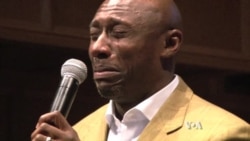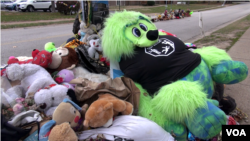Many white residents of Ferguson, Missouri, say they chose to live in the St. Louis suburb because of its diversity. So they were shocked when a white police officer killed an unarmed black teenager in an August street confrontation — and shaken by the resulting protests and violence.
Now, as they await a grand jury decision on whether to indict Officer Darren Wilson in the shooting death of Michael Brown, many are trying to figure out where to go from here.
Some churches here in this central U.S. community are leading the conversation.
Pastor Willis Johnson of Wellspring Church devoted his entire Sunday service to the issue, changing his usual routine and making his congregation members stand up and hug one another. He wants the community to initiate what he admits is a tough conversation.
Johnson said he believes it’s his duty to "challenge people to do something, in some way, regarding not just this issue but the many issues that are human issues that we have to address."
His United Methodist congregation has been partnering with other churches, as well as nearby school districts, to help the community deal with the aftermath of Brown's death.
The pastor also is trying to give a sense of direction and purpose to people who are grappling with what to do next and how to do it.
Seeking different perspectives
"I think there is a lot of drive here to change things, and people don't know what to do with that," said Katie Turnbull, a Caucasian member of Johnson’s predominantly African-American congregation.
"It helps me to understand different perspectives, and I think that we all need to reach out to one another and understand what everyone is feeling about what's going on," said Turnbull, who came to Wellspring from another United Methodist church specifically in response to the Brown situation.
While she isn't alone in trying to find ways to deal with this issue, Johnson worries that not everyone is as open-minded.
"What I fear is people are not being heard, not seeking to understand, and not thinking through the purposes of our actions — and that's on both sides," he said.
Individuals and small groups in the community seem motivated and want to participate in efforts to resolve deep-seated issues of race and socio-economic inequity. But Turnbull and Pastor Johnson agree that the conversation is not as widespread as it needs to be.
They also believe this is not something that can be accomplished in the short term. Along with more intense conversation, Johnson said, resolution will demand laboring together "a little bit longer."
And it's going to require a lot more heavy lifting, and it's going to require us to be long suffering," he said.
Many in Ferguson say that they hope the unarmed teenager’s death will ultimately bring about concrete changes and an improved relationship between community members and police.









